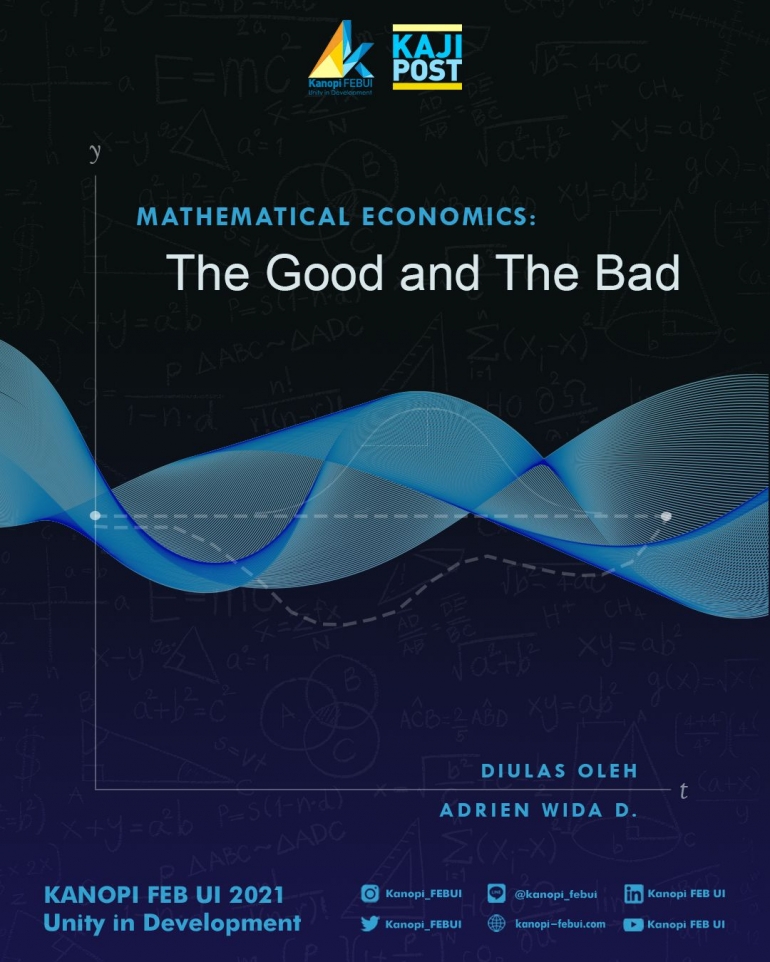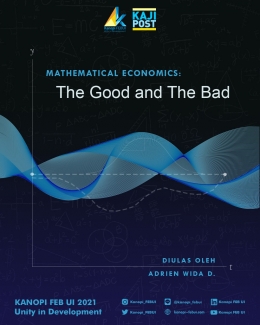Winnetou, a sophomore majoring in economics, at first chose to major in economics because he was keen to learn more about economic phenomena. However, upon undertaking the major, he was astounded to see the amount of mathematics required in the major.
That much sums up the current state of economic programs and modules. Any economics student will tell you that the subject they study the most is mathematics. The reason for this is that, since the late nineteenth century, there has been a desire to take economics to the level of science, comparable to physics. Most of this was accomplished through the quantification of economic events and their explanation through charts and graphs.
Mathematics is surely useful for economics, but it's not everything. Thus, there have been growing concerns about the overuse of mathematics in economics. Has economics always been full of mathematics? Is economics supposed to be math-heavy? How much should mathematics be used in economics? This essay aims to answer these questions by looking at the theories and empirical evidence.
Has it Always Been This Way?
A.A. Cournot, a French economist, mathematician, and philosopher, pioneered the mathematical transformation of economics in 1838. Two notable examples are Leon Walras in1874, and Vilfredo Pareto in1909, who figured out the parameters of "general equilibrium" numerically. Alfred Marshall was a major figure in promoting quantitative economics, although he restricted his own equations and even graphics to appendices, preferring to deliver his results verbally.
The late nineteenth-century work of W. Stanley Jevons provided a major push for the mathematical method. Jevons informed fellow economists in his foreword to the second edition of The Theory of Political Economy that "their profession can be adequately presented only on a clearly mathematical foundation." Jevons went even farther, claiming that "all economic authors must be mathematical in the sense that they deal with economic quantities and their connections, and all numbers and their interactions fall within the realm of mathematics." (1965, Jevons).
Then, in the 1930s, the Keynesian revolution happened. Economics had undergone a major revolution. The verbal, logical technique was largely supplanted by extensive use of graphs, mathematics, and statistics. Today, the bulk of economists are engrossed with the building of economic models in the manner of classical mechanics, which incorporate a plethora of intricate numerical correlations. Just a tiny number of unconventional economists, primarily proponents of the "free market," have expressed substantial challenges to this technique.
Mathematics has unquestionably benefited economics. Mathematics enables economists to conduct quantitative experiments and develop models for forecasting future economic development. Mathematical models have aided economists in establishing links between variables and analyzing their logic.
It is Unmeasurable
Some of the early skeptics of mathematical approaches argued that economic variables are intrinsically qualitative and hence unmeasurable. Political economy deals with intangible ideas such as utility, desire, want, welfare, and preference. It is dubious to attempt to quantify these mostly subjective and qualitative elements. On these grounds, J. B. Say, a prominent nineteenth-century French economist, was opposed to the use of mathematical and statistical methods in economics (Menard, 1980).
Modern commentators have a more nuanced approach. While they acknowledge the value of quantification, they stress out its actual or perceived costs. Kenneth Boulding, for example, stated that quantification results in "reducingism," or the reduction of complicated structures and sets to single numbers, a method that might significantly mislead us when it comes to human well-being. Thus, quantifying in economics entails oversimplification. This idea resounds throughout Nicholas Georgescu- Roegen's literature.
Boulding addressed the following issue in his review of Samuelson's Foundations for the Journal of Political Economy: "What qualifies as a "mathematical" subject?" His response was that economic variables are inherently diverse, which makes them impossible to describe using numerical averages, as the significance of each component is decided only by its relationship to the total. While some regard Boulding as technically ignorant, he is just building on Henri Poincare's theories, one of the best modern mathematicians (Poincare, 1905). In a similar spirit, Georgescu-Roegen highlights the importance of cultural and institutional factors in economics, which mathematical models cannot reflect.
Thus, the challenge stems from economics' inherent complexity---multidimensional, moral, philosophical, metaphysical, institutional, and cultural in nature---which precludes universal quantification. Thus, mathematical modelling, regardless of its sophistication, is incapable of representing the economy's intricacy and diversity. As a result, quantification frequently serves as a false prophet, promising far more than it is capable of delivering. This critique is particularly directed at the industry of econometric model construction and forecasting, whose track record in predicting is often seen as terribly poor.
Is Mathematics truly a Language?
In a 1986 poll of economists, Grubel and Boland discovered that the majority of respondents believed mathematics had a grip over academic economics---a situation they deemed undesirable.
Those who advocate for the use of mathematical tools in economics frequently argue that mathematics is only a language. Additionally, it is advantageous as the language of logic and all sciences. Converting statements to equations simplifies the argument's logic, eliminates ambiguity, and increases conciseness.
Modern variants of this assertion assert that mathematical analysis is preferable to literary analysis since it brings flaws to light. The phrase is attributed to Poisson: "Mathematics has no symbols for perplexed notions." The profession's practice appears to have embraced the content of Poisson's assertion. From its prior role as a conduit for economic understanding, mathematics is now viewed as a necessary but not sufficient condition for articulating economic truth (Grubel and Boland, 1986). However, if this is the case, we must be cognizant of mathematics' inherent biases.
While mathematics may be regarded as a language with some advantages, it also has a number of shortcomings that make it inappropriate for economic research. Boulding remarked in 1948, "I am unaware of any mathematical explanation for the literary term 'I love you.'"
Mathematics can be either pure theory or applied. Its growth history is replete with examples of this conflict between the advancement of theory and the emphasis on application. On the other hand, economics is primarily an applied, policy-oriented study. According to certain writers, mathematical analysis is strongly pro-theory. The use of mathematics in economics enables this to be included into economic study.
The pro-theory bias is seen in the subject matter chosen for analysis. Cournot's declaration that he dealt primarily with issues that could be solved mathematically was at the very least an explicit admission of his chosen approach's limits. We have secretly accepted new habits as a result of the acceptance of mathematics as the most credible language of economic research.
Becoming a More Serious Science
One must accept that mathematics may and does serve as a cornerstone for current academic economics. However, in our pursuit of technical virtuosity, we frequently overlook the fact that this foundation should be one of numerous pillars ("a" foundation, not "the" foundation) upon which economics' structure should be built. Economic, historical, sociological, and political knowledge, as well as literature and philosophy of society, are all critical pillars. Today, many fields of economics have lost the sensitivity and balance required when working with a tool like mathematics.
Nonetheless, a new generation of economists has pushed the industry toward a more empirical attitude, emphasizing evidence over theory. Alan Krueger is one such case. Lawrance Katz, a Harvard economist once said that Alan Krueger "really changed the shape of economics and turned it into a more serious science." This is due to his empirical research.
Krueger is likely best recognized for his early 1990s work on the impacts of the minimum wage, which he conducted in partnership with Mr. Katz and David Card, the 2021 Nobel winner. Mr. Katz stated that he and Mr. Krueger anticipated to discover the same result. Rather than that, they detected no effect on employment -- a conclusion that has been important, though it is still debatable.
Krueger was content to follow the evidence wherever it led (Katz, 2019). His work was genuinely illustrative of why economics needs mathematics. However, we must constantly keep in mind that mathematics is not economics, and hence courses should include content on other aspects of economics. As John Maynard Keynes put it, "[t]he great economist must possess a rare mix of abilities - he must be a mathematician, historian, politician, and to some extent a philosopher" (Keynes, 1936).
Adrien Wida Devachandra | Economics 2020 | Staff of Kanopi FEB UI Studies Division 2020/2021
References
Casselman, B., & Tankersley, J. (2019, March 18). Alan B. Krueger, economic aide to Clinton and Obama, is dead at 58. The New York Times. Retrieved November 12, 2021, from https://www.nytimes.com/2019/03/18/obituaries/alan-krueger-dead.html.
Edesess, M. (2012, May 20). Economics is not math. Institute for New Economic Thinking. Retrieved November 12, 2021, from https://www.ineteconomics.org/about/news/2012/economics-is-not-math.
GRUBEL, H. E. R. B. E. R. T. G., & BOLAND, L. A. W. R. E. N. C. E. A. (1986). On the efficient use of mathematics in economics: Some theory, facts and results of an opinion survey. Kyklos, 39(3), 419--442. https://doi.org/10.1111/j.1467-6435.1986.tb00779.x
Jevons, W. S., & Jevons, H. S. (1912). Theory of political economy. W. S. Jevons , H. S. Jevons. Journal of Political Economy, 20(6), 652--652. https://doi.org/10.1086/252072
Mnard, C. (1980, January 1). Three forms of resistance to statistics: Say, Cournot, Walras, by Claude Menard. History of Political Economy. Retrieved November 12, 2021, from https://ideas.repec.org/a/hop/hopeec/v12y1980i4p524-541.html.
Poincar, H. (2010). Science and hypothesis. Forgotten Books.
Quddus, M., & Rashid, S. (1994). The Overuse of Mathematics in Economics: Nobel Resistance. Eastern Economic Journal, 20, 251--265.
Reed, L. W. (1977, April 1). A critique of mathematical economics: Lawrence W. Reed. FEE Freeman Article. Retrieved November 12, 2021, from https://fee.org/articles/a-critique-of-mathematical-economics/.
Baca konten-konten menarik Kompasiana langsung dari smartphone kamu. Follow channel WhatsApp Kompasiana sekarang di sini: https://whatsapp.com/channel/0029VaYjYaL4Spk7WflFYJ2H








